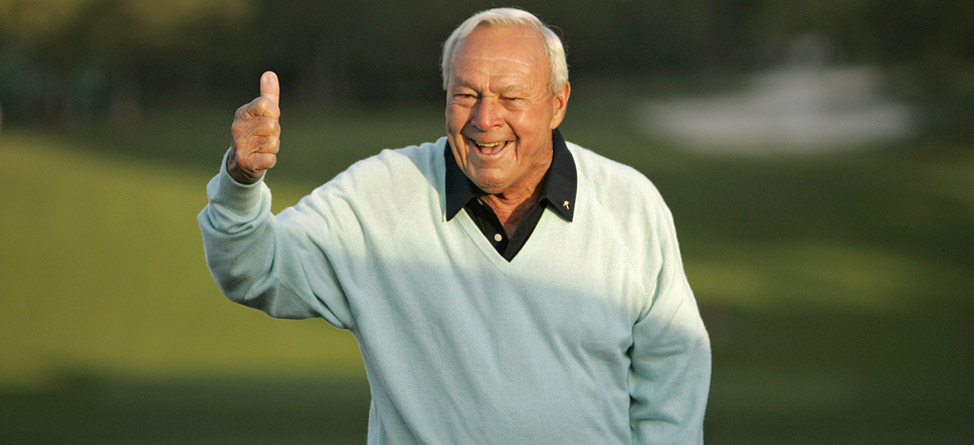Arnold Palmer didn’t put golf on the map, but you could say he put the game on TV.
Palmer, who became a megastar in the early days of sports television in the 1960s and probably was the most popular golfer in history, died in Pittsburgh on Sunday night at age 87.
“I was shocked to hear that we lost a great friend — and that golf lost a great friend,” Jack Nicklaus, Palmer’s greatest rival and one of his best friends, said in a statement. “At this point I don’t know what happened, and I suppose it is not important what happened. What is important is that we just lost one of the incredible people in the game of golf and in all of sports.
“My friend — many people’s friend — just wore out. I know he was in Pittsburgh trying to find out how to make himself better. That’s what Arnold has always tried to do. He has always been a fighter and he never gave up on anything. He didn’t give up even now. Maybe his body did, but I know Arnold’s will and spirit did not.”
Palmer, Nicklaus and Gary Player of South Africa comprised golf’s “Big Three” some 50 years ago, and they were so popular that they had their own weekly television show, appropriately “Big Three Golf.”
And the PGA Tour became a weekend staple on the major networks.
“Television and Palmer took over golf simultaneously,” wrote Jim Murray, the Pulitzer Prize-winning sports columnist of the Los Angeles Times. “He was the Perils of Pauline. Every round was a cliffhanger. Continued next week.”
Born in Latrobe, Pa., on Sept. 10, 1929, Palmer grew up right next to Latrobe Country Club, but not with a silver spoon in his mouth. He was the son of Deacon Palmer, head pro and greenskeeper at the club.
Palmer remembered being limited in when he could play the course and even swim in the pool or enter the locker room when he bought the course years later.
When he did get a chance to practice and play with his father, Palmer developed on unorthodox swing that later caused sweet-swinging Ben Hogan to say with disdain: “How the hell did Palmer get into the Masters?”
A few days later in 1958, Palmer used that swing to win the first of his four Green Jackets, the others coming in 1960, 1962 and 1964.
At Augusta National and everywhere else he played, Palmer was followed by massive, adoring crowds that came to be known as “Arnie’s Army.”
The name originally came from a group of soldiers from Fort Gordon, Ga., near Augusta, who served as security personnel at the Masters.
Palmer attended Wake Forest on a golf scholarship but left school and joined the Coast Guard because he was devastated when his best friend, Bud Worsham, died in an auto accident.
After spending three years in the Coast Guard and honing his game,
Palmer captured the 1954 United States Amateur and the next year as a rookie on the PGA Tour, he won the 1955 Canadian Open and earned all of $2,400.
In addition to his Masters titles, Palmer won the 1960 U.S. Open (by two strokes over Nicklaus) at Cherry Hills Country Club in Denver, the Open Championship in 1961 at Royal Birkdale and repeated the following year at Royal Troon.
The top American players had been ignoring the oldest championship in the world for several years, but Palmer going to the United Kingdom and winning led to a resurgence of the tournament.
Arnie, nicknamed “The King,” never would win the PGA Championship to complete the career Grand Slam, finishing second an agonizing three times — in 1964, 1968 and 1970.
It didn’t matter to his legion of fans, who swarmed around him on the course or crowded close to their televisions when he made one of his patented charges — hitching up his pants while striding powerfully up the fairway while chain-smoking, sticking out his jaw and swinging all-out on every shot.
“When he hits the ball, the earth shakes,” said Gene Littler, the 1961 U.S. Open champion.
Despite his fame, Palmer never forgot the fans, tirelessly signing autographs for hours and having his picture taken with anyone who took the time to ask.
And he took care in doing it.
Palmer was at an autograph session several years ago with fellow pro Peter Jacobsen, now a television golf analyst. Arnie, whose autograph always was legible, looked over at Jacobson scribbling something that was unrecognizable.
“What the hell is that?” Palmer asked. “If people think you are important enough to ask for your autograph, give them something they can read.”
Palmer was good friends with President Dwight D. Eisenhower and comedian Bob Hope, both avid golfers, but he was popular with the masses because he made them feel like he was one of them.
When Palmer received the Presidential Medal of Freedom in 2004 and the Congressional Gold Medal in 2012, he went out onto Pennsylvania Avenue each time and signed autographs for hundreds of fans.
“Arnold meant everything to golf, are you kidding me?” Tiger Woods said. “I mean, without his charisma, without his personality in conjunction with TV — it was just the perfect symbiotic growth.
“You finally had someone who had this charisma, and they’re capturing it on TV for the very first time. Everyone got hooked to the game of golf via TV because of Arnold.”
And it came full circle in 1995, when Palmer was a driving force in the founding of the Golf Channel.
–Story courtesy of The Sports Xchange, TSX Golf Editor Tom LaMarre

